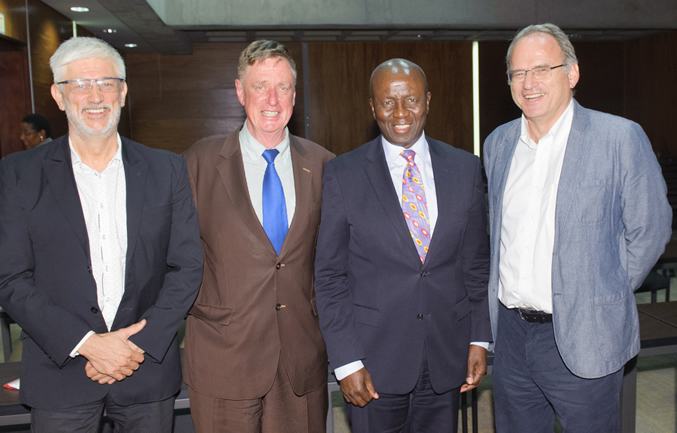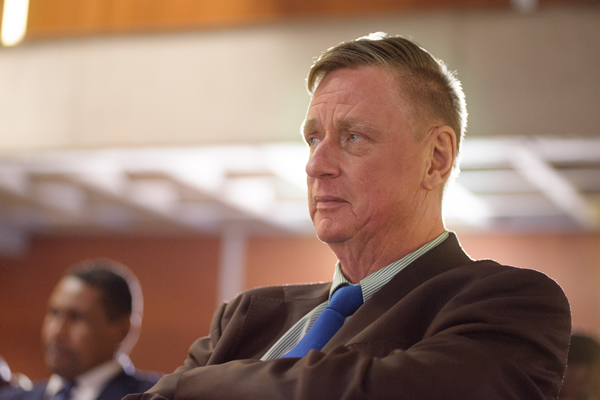Justice Johann van der Westhuizen retired from the South African Constitutional Court at the end of February 2016, after serving his term of 12 years. The year the Centre for Human Rights celebrates 30 years of its existence, Johann returns to the Centre he founded in 1986. He holds a part-time position of Extraordinary Professor in the Centre.
On 15 March 2016, honouring his term at the Court and welcoming him back, the Centre hosted a forum ‘Realising human rights in life and law: Reflections on the Constitutional Court term of Justice Johann van der Westhuizen’.
Two present justices, Deputy Chief Justice Moseneke and Justice Kampepe and one past judge of the Constitutional Court, Justice Zak Yacoob, provided some reflections.
Deputy Chief Justice Moseneke introduced the audience to a number of Justice van der Westhuizen’s most celebrated judgments.
Justice Yacoob spoke in celebration of Justice van der Westhuizen’s time at the Court. Beyond displaying great technical competence, he praised Justice van der Westhuizen’s integrity and especially his humanity. He was a great judge because he is a great human being and a consummate non-racialist.
Justice Kampepe referred to a speech Justice van der Westhuizen had made, in which he identified “seven commandments” for judicial excellence. She then measured his own performance against these yardsticks. As for personal integrity, and excellent work ethic, she contended that ‘the record speaks for itself’. She then focused on the third requirement, intellectual rigour, and remarked on how Justice van der Westhuizen always spotted and called out “the elephant in the room”. He was the one to consistently ask probing questions, which then “found their way into every other judge’s nightmares”. She described him as an intellectual maverick, who is able to answer his own complex questions with great flair.
She also lauded his independent thinking, linked to his intellectual prowess. He also espoused the values of the Constitution – both in his professional endeavours, but also – and particularly – in his personal life. His humanity is a distinguishing characteristic. But above all, his sense of humour endeared him to the other judges. He was often able to defuse tense situations with a bit of laughter. She also quoted from some of his judgments to show how he engaged in the seriousness of constitutional adjudication with a twinkle in the eye. In her view, his probing questions invariably led to better reasoned judgments. His judgments are also often an enjoyable read, crisp and in the style of a phenomenal story teller.

Prof Frans Viljoen (Current Director, Centre for Human Rights), Justice Johann van der Westhuizen (Founding Director),
Deputy Chief of South Africa Justice Dikgang Moseneke and Prof Christof Heyns (Former Director, Centre for Human Rights)
Dr James Fowkes, who was Justice van der Westhuizen’s clerk for a year, gave a brief overview of salient issues emerging from Justice van der Westhuizen’s jurisprudence. He characterized his approach as one of ‘judicial modesty’ and linked this approach to the fact that Justice van der Westhuizen’s judgments yielded a level of concurrence by his colleagues on the bench, in excess of the average level of concurrence.
Justice van der Westhuizen provided some reflections of his own, highlighting the changes that have occurred between the various epochs of the Constitutional Court. He expressed the view that, even if they have their personal preferences on matters, the judges of the Constitutional Court are all judging from a position of independence. He also celebrated the fact that, even if corruption may be reflected in some sectors of our society, this has not affected judiciary at the High Court level and above.
The Centre welcomes back its founding Director and looks forward to his contributions of excellence and humanity to the Centre, the Faculty of Law, the University of Pretoria, and the broader South African society.


